The Psychosocial Stage of Toddlerhood: Autonomy, Trust, and Emotional Development
VerifiedAdded on 2023/06/08
|6
|1435
|93
AI Summary
In this study we will discuss about psychosocial perspective and below are the summaries point:-
Erik Erikson's second stage of human development is the psychosocial stage of toddlerhood, where children work on developing autonomy and mastery over their physical abilities.
Changes in caregivers and lack of attention can lead to feelings of loneliness and neglect in toddlers, affecting their behavior and trust in others.
The events and experiences during this stage can impact a child's emotional connections and relationships in the future if not addressed properly.
Contribute Materials
Your contribution can guide someone’s learning journey. Share your
documents today.
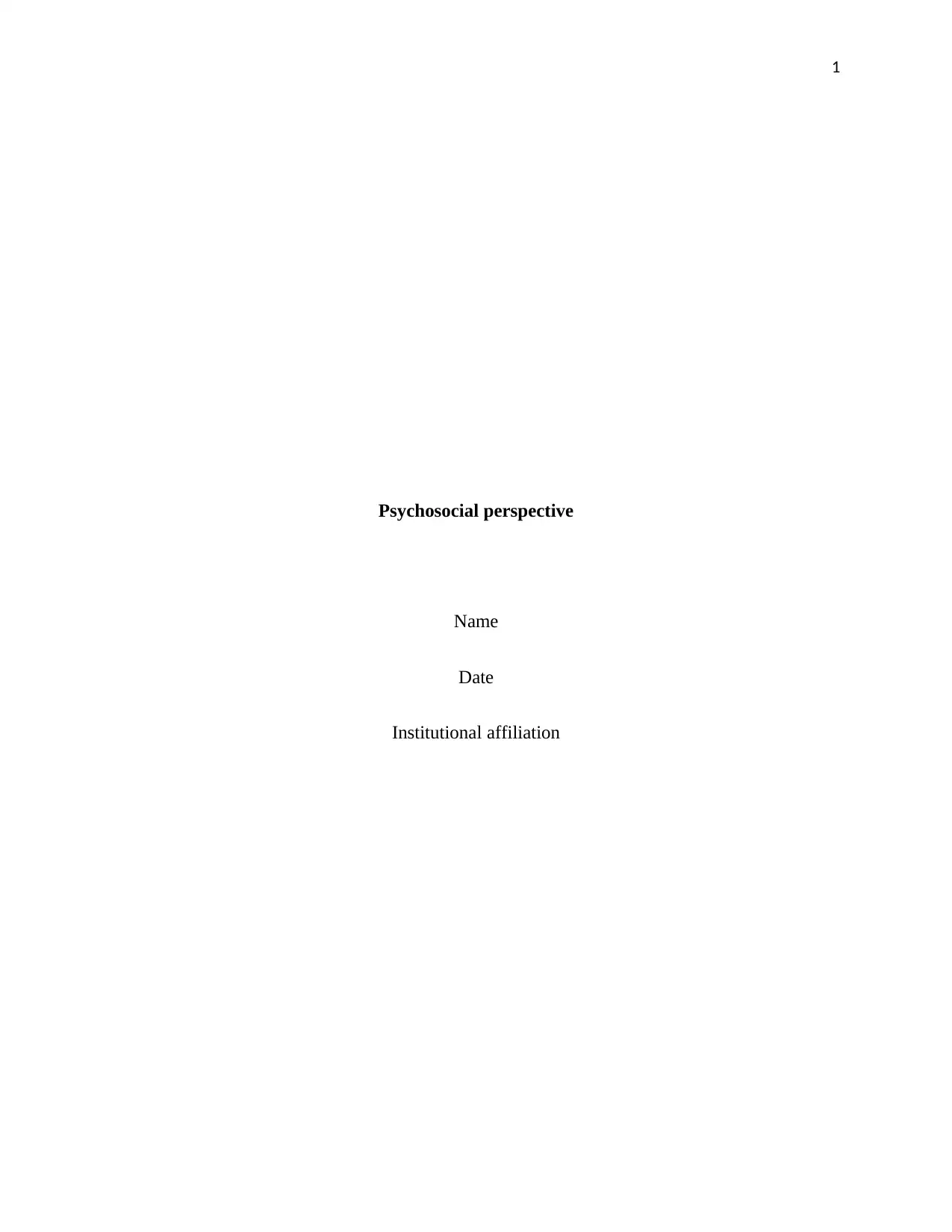
1
Psychosocial perspective
Name
Date
Institutional affiliation
Psychosocial perspective
Name
Date
Institutional affiliation
Secure Best Marks with AI Grader
Need help grading? Try our AI Grader for instant feedback on your assignments.
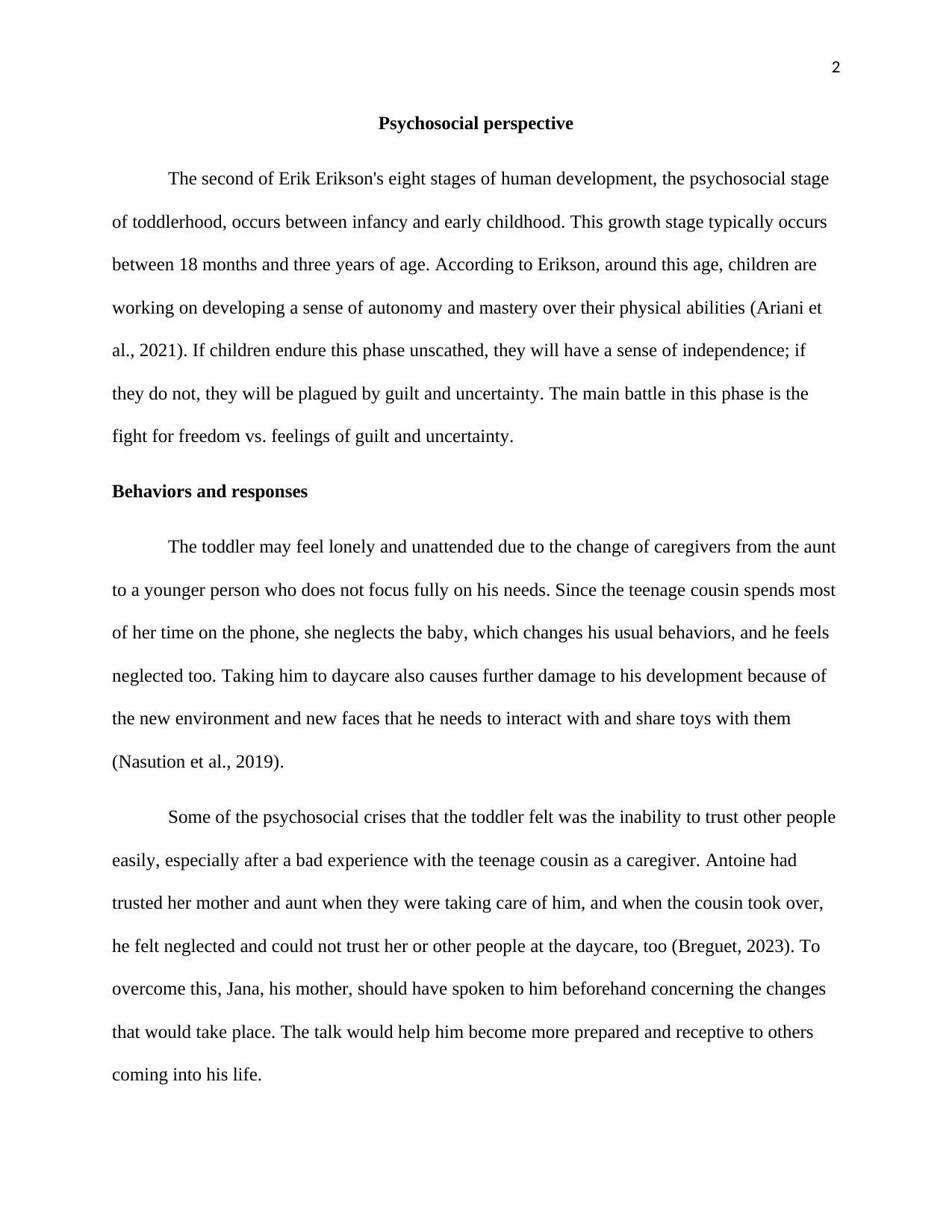
2
Psychosocial perspective
The second of Erik Erikson's eight stages of human development, the psychosocial stage
of toddlerhood, occurs between infancy and early childhood. This growth stage typically occurs
between 18 months and three years of age. According to Erikson, around this age, children are
working on developing a sense of autonomy and mastery over their physical abilities (Ariani et
al., 2021). If children endure this phase unscathed, they will have a sense of independence; if
they do not, they will be plagued by guilt and uncertainty. The main battle in this phase is the
fight for freedom vs. feelings of guilt and uncertainty.
Behaviors and responses
The toddler may feel lonely and unattended due to the change of caregivers from the aunt
to a younger person who does not focus fully on his needs. Since the teenage cousin spends most
of her time on the phone, she neglects the baby, which changes his usual behaviors, and he feels
neglected too. Taking him to daycare also causes further damage to his development because of
the new environment and new faces that he needs to interact with and share toys with them
(Nasution et al., 2019).
Some of the psychosocial crises that the toddler felt was the inability to trust other people
easily, especially after a bad experience with the teenage cousin as a caregiver. Antoine had
trusted her mother and aunt when they were taking care of him, and when the cousin took over,
he felt neglected and could not trust her or other people at the daycare, too (Breguet, 2023). To
overcome this, Jana, his mother, should have spoken to him beforehand concerning the changes
that would take place. The talk would help him become more prepared and receptive to others
coming into his life.
Psychosocial perspective
The second of Erik Erikson's eight stages of human development, the psychosocial stage
of toddlerhood, occurs between infancy and early childhood. This growth stage typically occurs
between 18 months and three years of age. According to Erikson, around this age, children are
working on developing a sense of autonomy and mastery over their physical abilities (Ariani et
al., 2021). If children endure this phase unscathed, they will have a sense of independence; if
they do not, they will be plagued by guilt and uncertainty. The main battle in this phase is the
fight for freedom vs. feelings of guilt and uncertainty.
Behaviors and responses
The toddler may feel lonely and unattended due to the change of caregivers from the aunt
to a younger person who does not focus fully on his needs. Since the teenage cousin spends most
of her time on the phone, she neglects the baby, which changes his usual behaviors, and he feels
neglected too. Taking him to daycare also causes further damage to his development because of
the new environment and new faces that he needs to interact with and share toys with them
(Nasution et al., 2019).
Some of the psychosocial crises that the toddler felt was the inability to trust other people
easily, especially after a bad experience with the teenage cousin as a caregiver. Antoine had
trusted her mother and aunt when they were taking care of him, and when the cousin took over,
he felt neglected and could not trust her or other people at the daycare, too (Breguet, 2023). To
overcome this, Jana, his mother, should have spoken to him beforehand concerning the changes
that would take place. The talk would help him become more prepared and receptive to others
coming into his life.
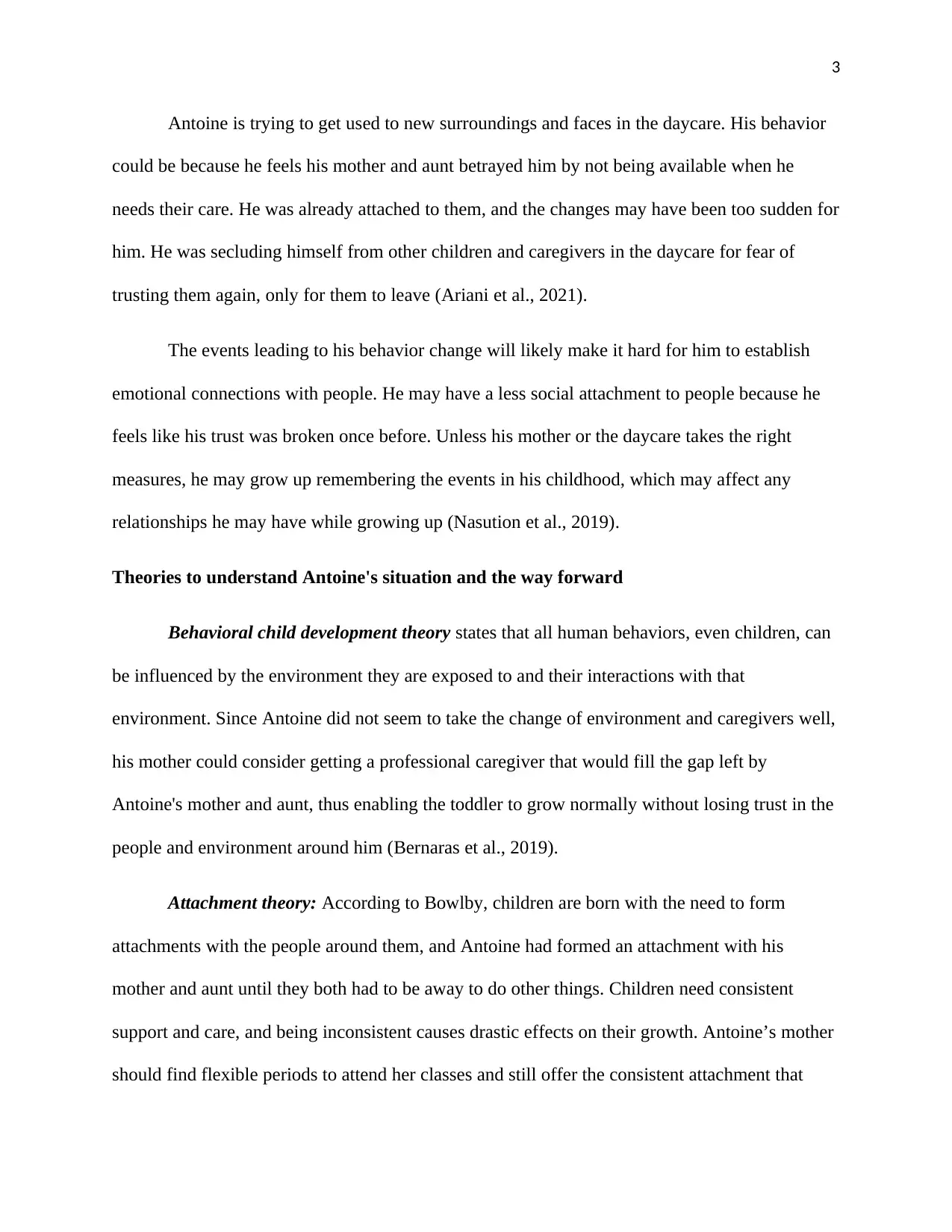
3
Antoine is trying to get used to new surroundings and faces in the daycare. His behavior
could be because he feels his mother and aunt betrayed him by not being available when he
needs their care. He was already attached to them, and the changes may have been too sudden for
him. He was secluding himself from other children and caregivers in the daycare for fear of
trusting them again, only for them to leave (Ariani et al., 2021).
The events leading to his behavior change will likely make it hard for him to establish
emotional connections with people. He may have a less social attachment to people because he
feels like his trust was broken once before. Unless his mother or the daycare takes the right
measures, he may grow up remembering the events in his childhood, which may affect any
relationships he may have while growing up (Nasution et al., 2019).
Theories to understand Antoine's situation and the way forward
Behavioral child development theory states that all human behaviors, even children, can
be influenced by the environment they are exposed to and their interactions with that
environment. Since Antoine did not seem to take the change of environment and caregivers well,
his mother could consider getting a professional caregiver that would fill the gap left by
Antoine's mother and aunt, thus enabling the toddler to grow normally without losing trust in the
people and environment around him (Bernaras et al., 2019).
Attachment theory: According to Bowlby, children are born with the need to form
attachments with the people around them, and Antoine had formed an attachment with his
mother and aunt until they both had to be away to do other things. Children need consistent
support and care, and being inconsistent causes drastic effects on their growth. Antoine’s mother
should find flexible periods to attend her classes and still offer the consistent attachment that
Antoine is trying to get used to new surroundings and faces in the daycare. His behavior
could be because he feels his mother and aunt betrayed him by not being available when he
needs their care. He was already attached to them, and the changes may have been too sudden for
him. He was secluding himself from other children and caregivers in the daycare for fear of
trusting them again, only for them to leave (Ariani et al., 2021).
The events leading to his behavior change will likely make it hard for him to establish
emotional connections with people. He may have a less social attachment to people because he
feels like his trust was broken once before. Unless his mother or the daycare takes the right
measures, he may grow up remembering the events in his childhood, which may affect any
relationships he may have while growing up (Nasution et al., 2019).
Theories to understand Antoine's situation and the way forward
Behavioral child development theory states that all human behaviors, even children, can
be influenced by the environment they are exposed to and their interactions with that
environment. Since Antoine did not seem to take the change of environment and caregivers well,
his mother could consider getting a professional caregiver that would fill the gap left by
Antoine's mother and aunt, thus enabling the toddler to grow normally without losing trust in the
people and environment around him (Bernaras et al., 2019).
Attachment theory: According to Bowlby, children are born with the need to form
attachments with the people around them, and Antoine had formed an attachment with his
mother and aunt until they both had to be away to do other things. Children need consistent
support and care, and being inconsistent causes drastic effects on their growth. Antoine’s mother
should find flexible periods to attend her classes and still offer the consistent attachment that
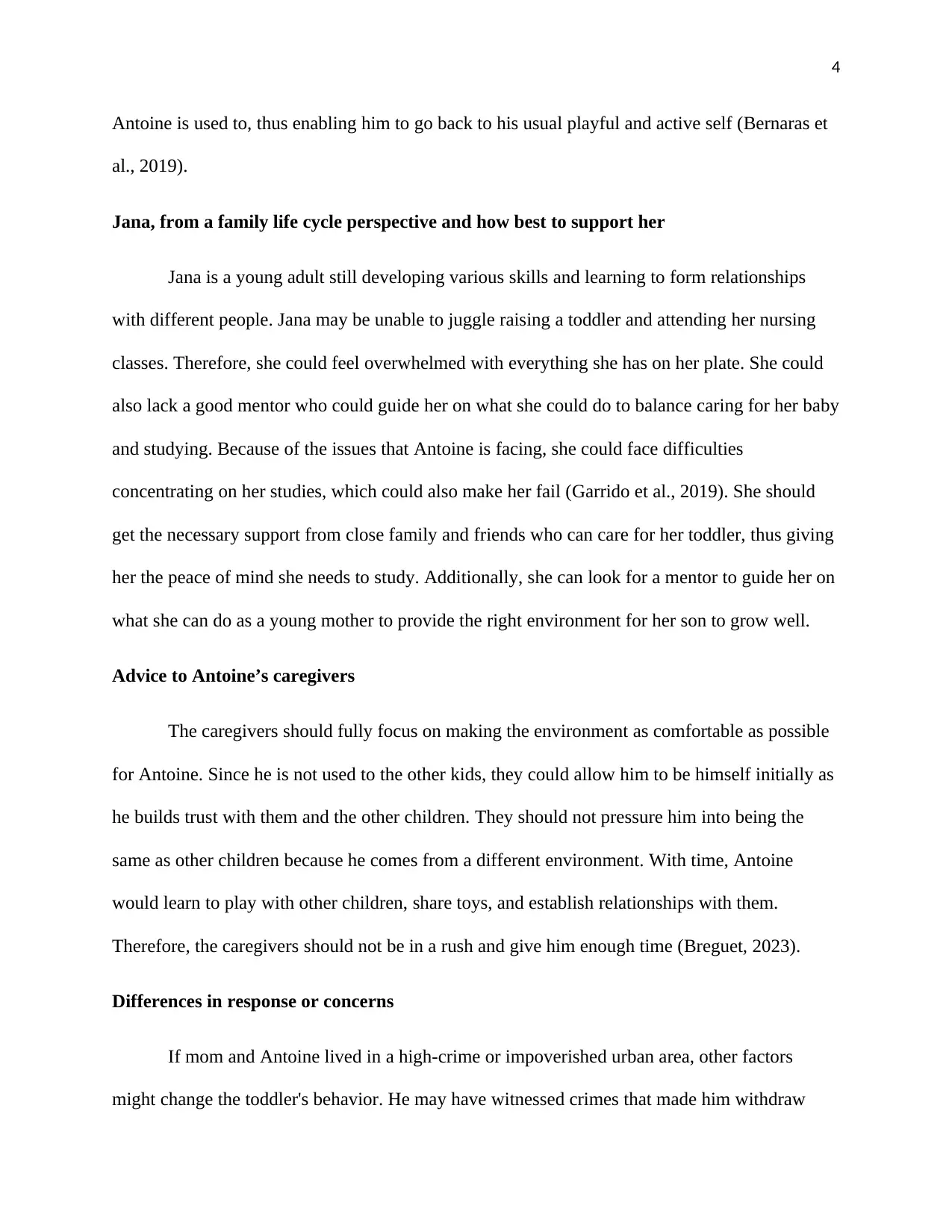
4
Antoine is used to, thus enabling him to go back to his usual playful and active self (Bernaras et
al., 2019).
Jana, from a family life cycle perspective and how best to support her
Jana is a young adult still developing various skills and learning to form relationships
with different people. Jana may be unable to juggle raising a toddler and attending her nursing
classes. Therefore, she could feel overwhelmed with everything she has on her plate. She could
also lack a good mentor who could guide her on what she could do to balance caring for her baby
and studying. Because of the issues that Antoine is facing, she could face difficulties
concentrating on her studies, which could also make her fail (Garrido et al., 2019). She should
get the necessary support from close family and friends who can care for her toddler, thus giving
her the peace of mind she needs to study. Additionally, she can look for a mentor to guide her on
what she can do as a young mother to provide the right environment for her son to grow well.
Advice to Antoine’s caregivers
The caregivers should fully focus on making the environment as comfortable as possible
for Antoine. Since he is not used to the other kids, they could allow him to be himself initially as
he builds trust with them and the other children. They should not pressure him into being the
same as other children because he comes from a different environment. With time, Antoine
would learn to play with other children, share toys, and establish relationships with them.
Therefore, the caregivers should not be in a rush and give him enough time (Breguet, 2023).
Differences in response or concerns
If mom and Antoine lived in a high-crime or impoverished urban area, other factors
might change the toddler's behavior. He may have witnessed crimes that made him withdraw
Antoine is used to, thus enabling him to go back to his usual playful and active self (Bernaras et
al., 2019).
Jana, from a family life cycle perspective and how best to support her
Jana is a young adult still developing various skills and learning to form relationships
with different people. Jana may be unable to juggle raising a toddler and attending her nursing
classes. Therefore, she could feel overwhelmed with everything she has on her plate. She could
also lack a good mentor who could guide her on what she could do to balance caring for her baby
and studying. Because of the issues that Antoine is facing, she could face difficulties
concentrating on her studies, which could also make her fail (Garrido et al., 2019). She should
get the necessary support from close family and friends who can care for her toddler, thus giving
her the peace of mind she needs to study. Additionally, she can look for a mentor to guide her on
what she can do as a young mother to provide the right environment for her son to grow well.
Advice to Antoine’s caregivers
The caregivers should fully focus on making the environment as comfortable as possible
for Antoine. Since he is not used to the other kids, they could allow him to be himself initially as
he builds trust with them and the other children. They should not pressure him into being the
same as other children because he comes from a different environment. With time, Antoine
would learn to play with other children, share toys, and establish relationships with them.
Therefore, the caregivers should not be in a rush and give him enough time (Breguet, 2023).
Differences in response or concerns
If mom and Antoine lived in a high-crime or impoverished urban area, other factors
might change the toddler's behavior. He may have witnessed crimes that made him withdraw
Secure Best Marks with AI Grader
Need help grading? Try our AI Grader for instant feedback on your assignments.
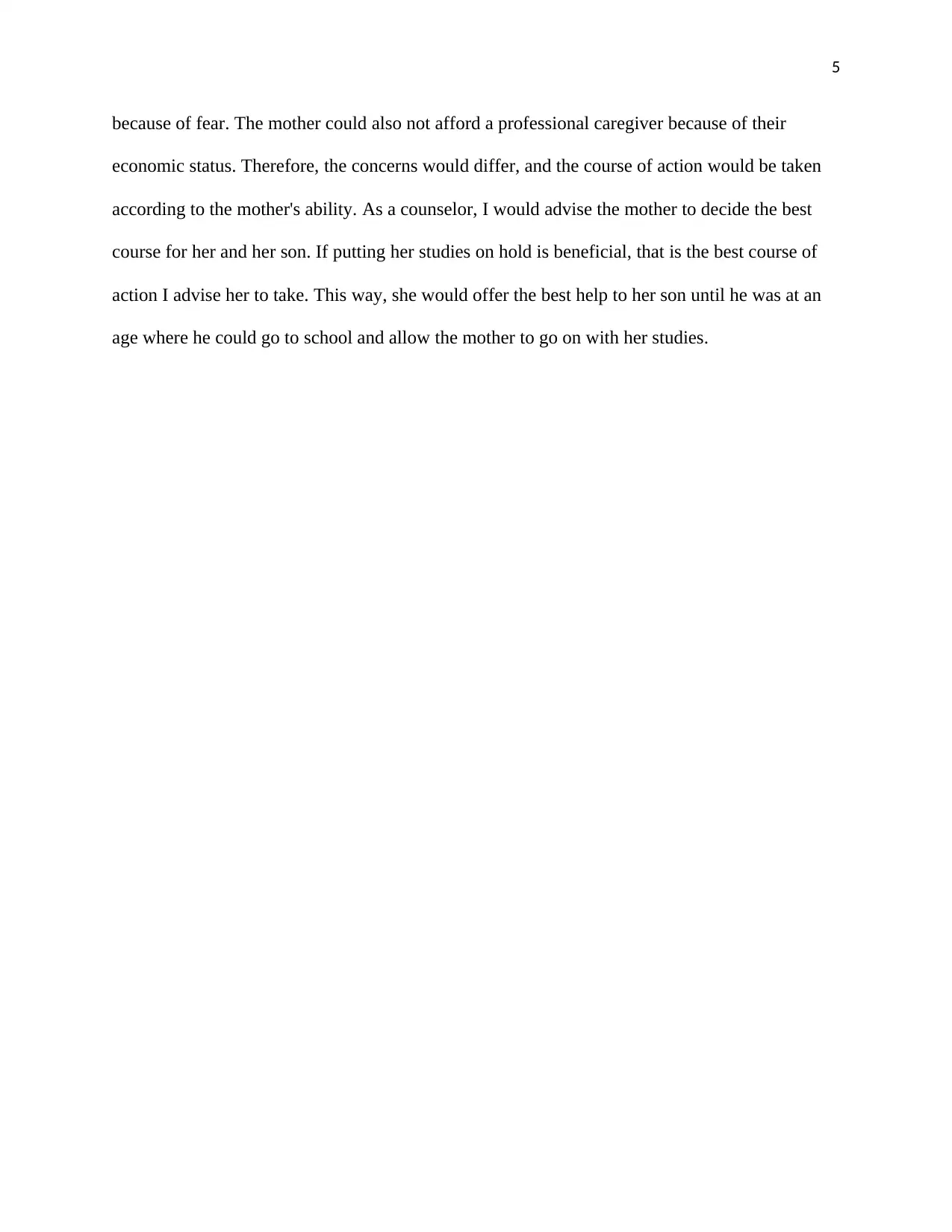
5
because of fear. The mother could also not afford a professional caregiver because of their
economic status. Therefore, the concerns would differ, and the course of action would be taken
according to the mother's ability. As a counselor, I would advise the mother to decide the best
course for her and her son. If putting her studies on hold is beneficial, that is the best course of
action I advise her to take. This way, she would offer the best help to her son until he was at an
age where he could go to school and allow the mother to go on with her studies.
because of fear. The mother could also not afford a professional caregiver because of their
economic status. Therefore, the concerns would differ, and the course of action would be taken
according to the mother's ability. As a counselor, I would advise the mother to decide the best
course for her and her son. If putting her studies on hold is beneficial, that is the best course of
action I advise her to take. This way, she would offer the best help to her son until he was at an
age where he could go to school and allow the mother to go on with her studies.
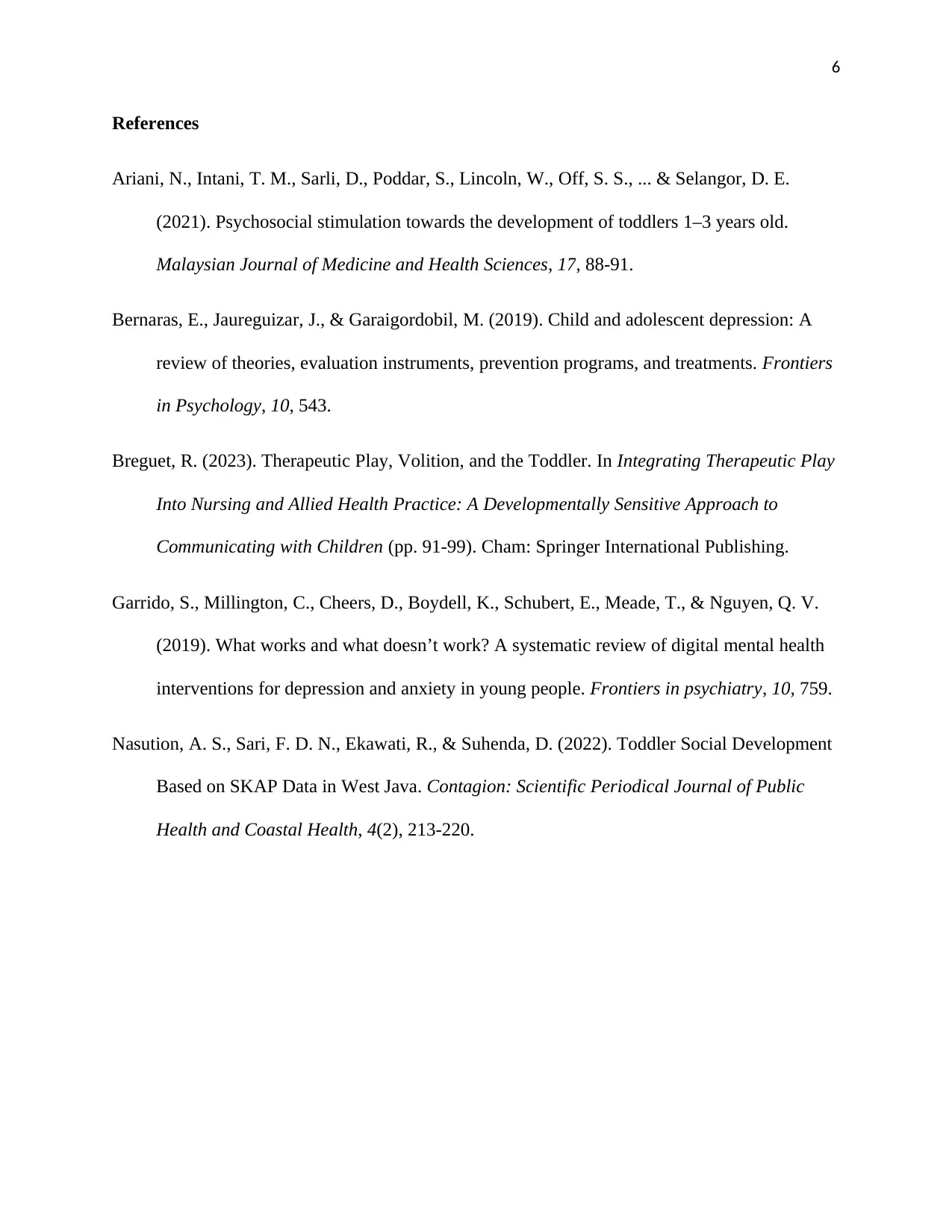
6
References
Ariani, N., Intani, T. M., Sarli, D., Poddar, S., Lincoln, W., Off, S. S., ... & Selangor, D. E.
(2021). Psychosocial stimulation towards the development of toddlers 1–3 years old.
Malaysian Journal of Medicine and Health Sciences, 17, 88-91.
Bernaras, E., Jaureguizar, J., & Garaigordobil, M. (2019). Child and adolescent depression: A
review of theories, evaluation instruments, prevention programs, and treatments. Frontiers
in Psychology, 10, 543.
Breguet, R. (2023). Therapeutic Play, Volition, and the Toddler. In Integrating Therapeutic Play
Into Nursing and Allied Health Practice: A Developmentally Sensitive Approach to
Communicating with Children (pp. 91-99). Cham: Springer International Publishing.
Garrido, S., Millington, C., Cheers, D., Boydell, K., Schubert, E., Meade, T., & Nguyen, Q. V.
(2019). What works and what doesn’t work? A systematic review of digital mental health
interventions for depression and anxiety in young people. Frontiers in psychiatry, 10, 759.
Nasution, A. S., Sari, F. D. N., Ekawati, R., & Suhenda, D. (2022). Toddler Social Development
Based on SKAP Data in West Java. Contagion: Scientific Periodical Journal of Public
Health and Coastal Health, 4(2), 213-220.
References
Ariani, N., Intani, T. M., Sarli, D., Poddar, S., Lincoln, W., Off, S. S., ... & Selangor, D. E.
(2021). Psychosocial stimulation towards the development of toddlers 1–3 years old.
Malaysian Journal of Medicine and Health Sciences, 17, 88-91.
Bernaras, E., Jaureguizar, J., & Garaigordobil, M. (2019). Child and adolescent depression: A
review of theories, evaluation instruments, prevention programs, and treatments. Frontiers
in Psychology, 10, 543.
Breguet, R. (2023). Therapeutic Play, Volition, and the Toddler. In Integrating Therapeutic Play
Into Nursing and Allied Health Practice: A Developmentally Sensitive Approach to
Communicating with Children (pp. 91-99). Cham: Springer International Publishing.
Garrido, S., Millington, C., Cheers, D., Boydell, K., Schubert, E., Meade, T., & Nguyen, Q. V.
(2019). What works and what doesn’t work? A systematic review of digital mental health
interventions for depression and anxiety in young people. Frontiers in psychiatry, 10, 759.
Nasution, A. S., Sari, F. D. N., Ekawati, R., & Suhenda, D. (2022). Toddler Social Development
Based on SKAP Data in West Java. Contagion: Scientific Periodical Journal of Public
Health and Coastal Health, 4(2), 213-220.
1 out of 6
Your All-in-One AI-Powered Toolkit for Academic Success.
+13062052269
info@desklib.com
Available 24*7 on WhatsApp / Email
![[object Object]](/_next/static/media/star-bottom.7253800d.svg)
Unlock your academic potential
© 2024 | Zucol Services PVT LTD | All rights reserved.